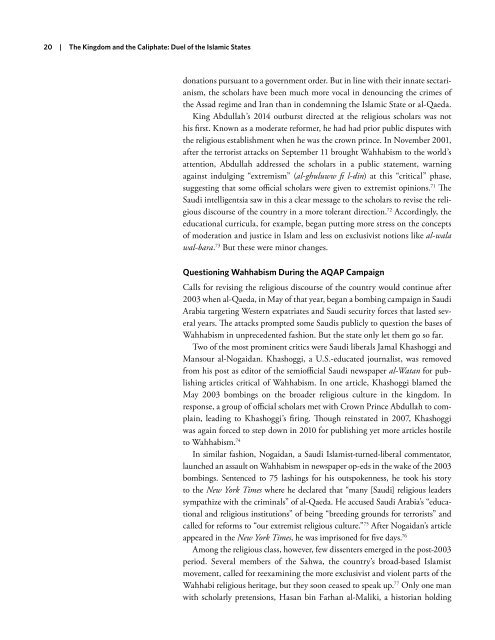Create successful ePaper yourself
Turn your PDF publications into a flip-book with our unique Google optimized e-Paper software.
20 | The Kingdom and the Caliphate: Duel of the Islamic States<br />
donations pursuant to a government order. But in line with their innate sectarianism,<br />
the scholars have been much more vocal in denouncing the crimes of<br />
the Assad regime and Iran than in condemning the Islamic State or al-Qaeda.<br />
King Abdullah’s 2014 outburst directed at the religious scholars was not<br />
his first. Known as a moderate reformer, he had had prior public disputes with<br />
the religious establishment when he was the crown prince. In November 2001,<br />
after the terrorist attacks on September 11 brought Wahhabism to the world’s<br />
attention, Abdullah addressed the scholars in a public statement, warning<br />
against indulging “extremism” (al-ghuluww fi l-din) at this “critical” phase,<br />
suggesting that some official scholars were given to extremist opinions. 71 The<br />
Saudi intelligentsia saw in this a clear message to the scholars to revise the religious<br />
discourse of the country in a more tolerant direction. 72 Accordingly, the<br />
educational curricula, for example, began putting more stress on the concepts<br />
of moderation and justice in Islam and less on exclusivist notions like al-wala<br />
wal-bara. 73 But these were minor changes.<br />
Questioning Wahhabism During the AQAP Campaign<br />
Calls for revising the religious discourse of the country would continue after<br />
2003 when al-Qaeda, in May of that year, began a bombing campaign in Saudi<br />
Arabia targeting Western expatriates and Saudi security forces that lasted several<br />
years. The attacks prompted some Saudis publicly to question the bases of<br />
Wahhabism in unprecedented fashion. But the state only let them go so far.<br />
Two of the most prominent critics were Saudi liberals Jamal Khashoggi and<br />
Mansour al-Nogaidan. Khashoggi, a U.S.-educated journalist, was removed<br />
from his post as editor of the semiofficial Saudi newspaper al-Watan for publishing<br />
articles critical of Wahhabism. In one article, Khashoggi blamed the<br />
May 2003 bombings on the broader religious culture in the kingdom. In<br />
response, a group of official scholars met with Crown Prince Abdullah to complain,<br />
leading to Khashoggi’s firing. Though reinstated in 2007, Khashoggi<br />
was again forced to step down in 2010 for publishing yet more articles hostile<br />
to Wahhabism. 74<br />
In similar fashion, Nogaidan, a Saudi Islamist-turned-liberal commentator,<br />
launched an assault on Wahhabism in newspaper op-eds in the wake of the 2003<br />
bombings. Sentenced to 75 lashings for his outspokenness, he took his story<br />
to the New York Times where he declared that “many [Saudi] religious leaders<br />
sympathize with the criminals” of al-Qaeda. He accused Saudi Arabia’s “educational<br />
and religious institutions” of being “breeding grounds for terrorists” and<br />
called for reforms to “our extremist religious culture.” 75 After Nogaidan’s article<br />
appeared in the New York Times, he was imprisoned for five days. 76<br />
Among the religious class, however, few dissenters emerged in the post-2003<br />
period. Several members of the Sahwa, the country’s broad-based Islamist<br />
movement, called for reexamining the more exclusivist and violent parts of the<br />
Wahhabi religious heritage, but they soon ceased to speak up. 77 Only one man<br />
with scholarly pretensions, Hasan bin Farhan al-Maliki, a historian holding



